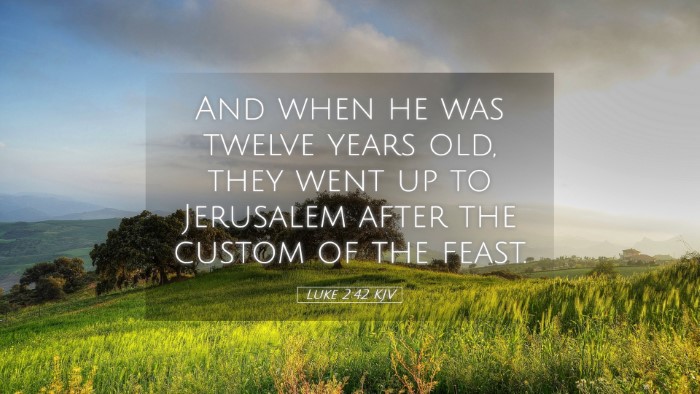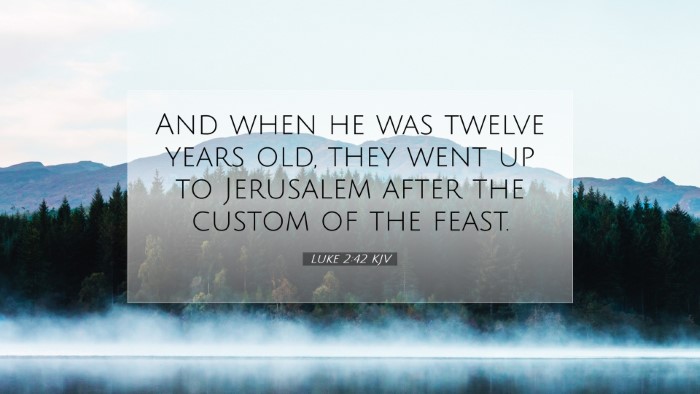Luke 2:42: Commentary and Insights
In Luke 2:42, we find a significant moment in the life of Jesus, wherein He is introduced to us not merely as a child, but as one engaged in profound spiritual matters at a tender age. This passage states:
"And when he was twelve years old, they went up to Jerusalem after the custom of the feast."
This verse, although brief, serves as a pivot for understanding the early life of Jesus and highlights the importance of Jewish customs and the role of Jesus within them. Below, we explore various aspects and insights into this passage.
1. Contextual Background
This verse occurs within the broader narrative of Jesus’ early life, notably detailed in Luke 2. Matthew Henry notes that this period marks a transition from childhood to adolescence, where Jesus begins to show signs of awareness of His divine mission. The trip to Jerusalem, being a customary pilgrimage during the Passover, indicates an adherence to Jewish traditions.
2. Significance of Age
At twelve years old, Jesus is at a significant age in Jewish tradition. Albert Barnes points out that this age traditionally symbolizes the transition into the responsibilities of adulthood, often celebrated with the Bar Mitzvah in contemporary Jewish practice. This indicated a time when young men would be expected to start understanding the Law of Moses more deeply.
2.1 Theological Implications
The age at which Jesus chose to engage in religious discussions signifies a direct engagement with His identity. Adam Clarke elucidates how this choice illustrates not only His human growth but also the early awareness of His divine mission, as seen in His discussions with the teachers in the temple shortly thereafter.
3. The Journey to Jerusalem
The journey to Jerusalem for the Passover feast was a significant pilgrimage for Jewish families. Matthew Henry emphasizes that such customs were deeply rooted in their faith and community life, affirming the importance of communal worship and observance of traditions. Traveling with family symbolizes the importance of familial bonds in the practice of faith.
3.1 Customary Observances
The phrase "after the custom of the feast" highlights not just a ritual but an essential practice that connects the people of Israel to their history of deliverance and covenant with God. Adam Clarke points out that engaging in these customs was meant to reinforce heritage, piety, and identity among the Israelites.
4. Jesus’ Engagement with the Temple
As this narrative progresses, the focus shifts to Jesus' remarkable discourse with the learned men in the temple. This not only showcases His wisdom but also serves as a precursor to His later ministry. Albert Barnes notes that such an encounter illuminates Jesus' understanding of Scripture at a young age, suggesting an extraordinary divine insight.
4.1 Educational Context
The temple serves as the educational hub where Jewish religion and law were taught. Jesus’ presence and participation in these discussions underscore a theme of seeking knowledge and truth. Matthew Henry emphasizes that children are to be taught the Scriptures and that Jesus’ engagement serves as a model for how youth are to approach learning.
5. Implications for Ministry and Discipleship
This episode imparts several lessons relevant to pastors and theological students:
- Importance of Knowledge: The early engagement of Jesus with Scripture teaches the importance of deep biblical knowledge and understanding as foundational for a robust faith.
- Value of Tradition: Pastors should acknowledge the role of traditions in shaping faith and fostering community.
- Youth Discipleship: Churches ought to invest in youth, understanding their potential for profound spiritual engagement and growth, as seen in Jesus' example.
6. Conclusion: The Formation of Christ's Identity
Luke 2:42 serves as a vital text in understanding the formation of Jesus’ identity and mission. It reflects the interactions of sacred tradition and individual growth within the context of faith. Pastors, students, and scholars are encouraged to delve into this narrative, draw practical applications, and cultivate a deeper understanding of how Jesus’ early life sets the groundwork for His later ministry and teachings.
Reflections
- What can we learn from Jesus’ commitment to His faith even at a young age?
- How do our traditions shape our understanding of God’s calling today?
- In what ways can we encourage the youth in our congregations to engage deeply with Scripture?


